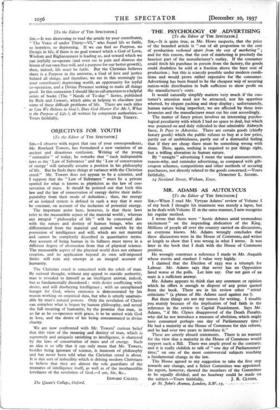MR. ADAMS AS AUTOLYCUS
[To the Editor of THE SPECTATOR.]
SIR,—When I read Mr. Vyvyan Adams' review of Volume I of my book I thought his treatment was merely a lapse, but as he deals with Volume II in the same manner, I now recognise his regular method.
I wrote that there were "hectic debates amid tremendous excitement" on the impending abdication of the King. Millions of people all over the country carried on discussions, as everyone knows. Mr. Adams wrongly concludes that these discussions were in the House of Commons, and writes at length to show that I was wrong in what I wrote. It was later in the book that I dealt with the House of Commons position.
He wrongly construes a reference I made to .Mr. Asquith whose merits and conduct I value very highly.
I claimed that the Election of 1935 was a triumph for Labour. Mr. Adams says that never has an Opposition fared worse at the polls. Let him say. Our net gain of 94 seats is a sufficient answer.
Mr. Adams appears to think that any comment or opinion which he offers is enough to dispose of any point quoted from the book. There are in his review other "trivial criticisms" (a phrase of Mr. Adams used against me !).
But these things are not my reason for writing. I trouble you mainly because of the implication of bad faith in the reference in the review to Capital Punishment. Says Mr. Adams, "if Mr. Clynes disapproved of the Death Penalty, why did he not introduce a measure of abolition, which might have consumed perhaps one day of Parliamentary time ? He had a majority at the House of Commons for this reform, and he had over two years to introduce it."
These are utterly absurd statements. There is no warrant for the view that a majority in the House of Commons would support such a Bill. There was ample proof to the contrary, and it is really childish to talk of "one day of Parliamentary time," on one of the most controversial subjects touching a fundamental change in the law.
The House agreed to my suggestion to take the first step towards any change, and a Select Committee was appointed. Its report, however, showed the members of the Committee to be equally divided, and no headway could be made on the subject.—Yours faithfully, J. R. CLYNES. .4' St. John's Avenue, ,London,






















































 Previous page
Previous page